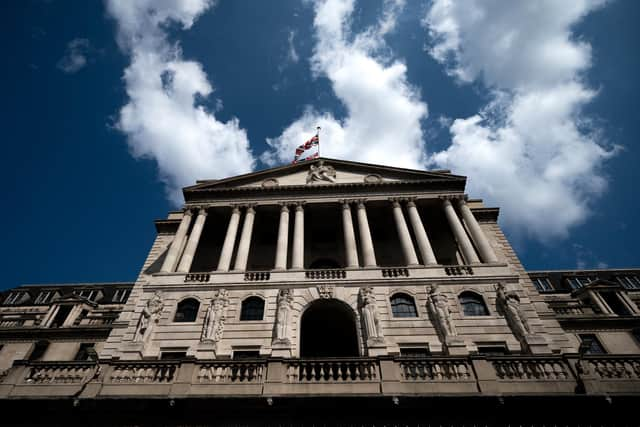Recession indicators 'flashing red' - GDP output slumps but Bank of England to stick to guns
Recession indicators are “flashing red” was the warning from analysts after it emerged that the UK economy had contracted faster than expected in October.
Gross domestic product (GDP) - a key measure of economic output - is estimated to have fallen by 0.3 per cent during the month, compared with 0.2 per cent growth in September, the Office for National Statistics (ONS) said. The downturn came as all three of the main sectors that the ONS tracks fell into negative territory for the first time since July. Economists had been forecasting a GDP contraction of just 0.1 per cent for October.
Advertisement
Hide AdAdvertisement
Hide AdONS director of economic statistics Darren Morgan said: “Our initial estimates suggest that GDP growth was flat across the last three months. Increases in services, led by engineering, film production and education - which recovered from the impact of summer strikes - were offset by falls in both manufacturing and housebuilding. October, however, saw contractions across all three main sectors.


“Services were the biggest driver of the fall with drops in IT, legal firms and film production - which fell back after a couple of strong months. These were also compounded by widespread falls in manufacturing and construction, which fell partly due to the poor weather.”
Thomas Pugh, economist at audit, tax and consulting firm RSM UK, said the 0.3 per cent month on month contraction followed flatlining growth in the third quarter and left “recession warning indicators flashing red”. He added: “The big picture is still one of a stagnating economy. We doubt growth will materially pick up until towards the end of next year, meaning that the spectre of recession will hang over the UK economy for a long time yet. Even though a contracting economy lessens the need to hold interest rates higher for longer, it is still far too early for the monetary policy committee to be considering interest rate cuts.”
The latest decision on interest rates is due this week with most analysts expecting the Bank of England to hold fire at a base rate of 5.25 per cent. That would make it the third meeting in a row that Britain’s central bank has held rates with any cut unlikely to take place until well into the new year.
Rob Morgan, chief investment analyst at Charles Stanley Direct, said the UK economy “continues to teeter on the edge of recession”, adding that the latest ONS data would be influential in the Bank of England’s monetary policy outlook. He noted: “Particularly wet weather during the month was cited as a negative factor, but that doesn’t change the bigger picture of an economy flatlining with risk to the downside. This contraction could herald the start of a mild recession, and at the very least it shows the economic resilience shown earlier in the year is wearing off in the face of rising inflation and borrowing costs.


“The lagged effect of a blisteringly swift hiking cycle for interest rates is now being felt by more households and businesses. It takes time for interest rate changes to filter through and show up in the GDP numbers. Going forward we can expect the picture to weaken a little further as interest rates remain in restrictive territory to ensure inflationary pressures are vanquished.”
The ONS data will give Bank of England policymakers some certainty that interest rates are high enough to be restrictive and dampen the economy. They are also aware that the full effect of their recent spate of interest rate hikes has not yet been felt.
People who have taken out new mortgages, have had to re-mortgage their properties or who are on a tracker mortgage will have seen their monthly payment rise significantly. About five million mortgages will still be up for renewal by the end of 2026. So far these people have avoided the hit of rising interest rates. But the rate setters on the nine-strong monetary policy committee (MPC), including bank governor Andrew Bailey, have stressed repeatedly that it is far too soon to talk about cutting rates.
Advertisement
Hide AdAdvertisement
Hide AdSamuel Tombs, chief UK economist at Pantheon Macroeconomics, said: “October’s drop in GDP adds to the growing list of recent downside data surprises, but we still doubt that the MPC will change its tune and signal its willingness to cut the bank rate next year as soon as this week’s meeting.”
Federation of Small Businesses chair Martin McTague described the GDP figures as “disappointing news” that “will leave many feeling flat”. While the larger services sector contributed the most to the slowdown in October, the production sector fell the most rapidly. It saw output down by 0.8 per cent on the back of a slowdown in manufacturing caused in part by the computer, electronics and optical products sectors. Meanwhile, the construction sector was hit by one of the rainiest Octobers in the last 200 years.
TUC general secretary Paul Nowak said: “These grim figures show the UK is dangerously close to recession. The red warning lights should be flashing. Unemployment is rising, vacancies are falling and living standards have plummeted.
“Rishi Sunak - and his cabinet of millionaires - may be cushioned from flatlining growth. But this Conservative economic failure is hitting jobs and living standards across Britain. The UK is stuck in a rut and the Tories have no plan for getting us out of it,” he added.
Shadow chancellor Rachel Reeves said the data showed that the Prime Minister was failing to grow the economy.
Comments
Want to join the conversation? Please or to comment on this article.